Home » Hunting Rules, Licenses, and Seasons » Upland Bird Hunting in Minnesota: Ruffed Grouse, Woodcock, Prairie Chicken, Pheasant and Other Small Game
Upland Bird Hunting in Minnesota: Ruffed Grouse, Woodcock, Prairie Chicken, Pheasant and Other Small Game
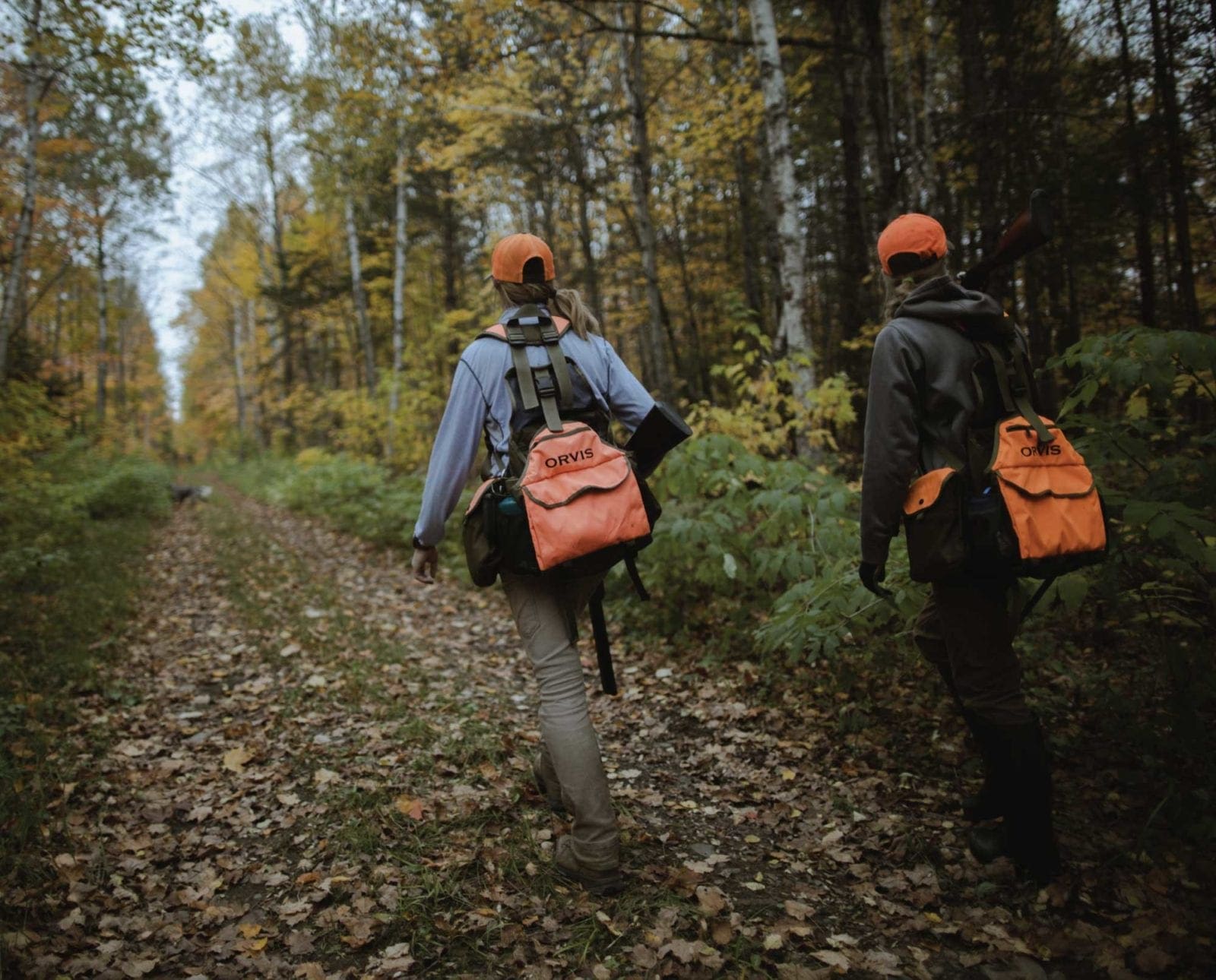
A.J. DeRosa, founder of Project Upland, is a New England…
Rules, regulations, and license fees for hunting birds in the most popular state in the upland bird hunting community.
When I think of sharp-tailed grouse hunting, I think of the prairie, not Minnesota. But a project with the Minnesota Sharp-tailed Grouse Society brought me just outside Thief River Falls, showing that prairie habitat—and wild sharptails—do indeed exist in Minnesota.
The winter day was grueling. Waist-deep snow on the open landscape made for hard hunting. Even with nature’s curve ball, we managed to put a couple of grouse in the bag and capture one on film. My previous Montana experience reminded me that it’s not always this difficult.
As we drove back toward Remer, I welcomed the chance to leave the stuffy hotel behind for Pineridge Grouse Camp, warm up by the fire, and return to my old friend: the ruffed grouse.
Disclaimer: I’m a New England native, but I’ve come to think of Minnesota as the center of the upland hunting world. From Pheasants Forever’s headquarters to the Ruffed Grouse Society National Hunt, it feels like the upland community revolves around this grouse hunting mecca.
Minnesota is more than 86,000 square miles of land with 200,000 acres of prairie, 17 million acres of forest, 10,000 lakes, 11 million acres of public hunting land, and the largest population of timber wolves outside Alaska. It’s massive and wild, and you can find some of America’s best grouse and woodcock hunting here.
Minnesota Upland Bird And Small Game Season Dates And Limits
| Species | Dates | Daily/Possession | Notes |
| Ruffed Grouse | Sept. 13, 2025 – Jan. 4 2026 | 5/10 Combined with Spruce Grouse | |
| American Woodcock | Sept. 20, 2025 – Nov. 3, 2025 | 3/9 | |
| Sharp-tailed Grouse | Sept. 13, 2025 – Nov. 30 2025 | 3/6 | Northwest zone only. East-central zone is closed |
| Pheasant | Oct. 11, 2025 – Jan. 4, 2026 | 2/6 (3/9 Dec. 1 – Jan. 1) Roosters Only | 9 a.m. to Sunset. |
| Prairie Chicken | Sept. 27, 2025 – Oct. 5 2025 | 2 (Season Limit) | Lottery only. Hunting is only allowed in prairie chicken quota areas |
| Hungarian Partridge | Sept. 20, 2025 – Jan. 4 2026 | 5/10 | |
| Spruce Grouse | Sept. 13, 2025 – Jan. 4 2026 | 5/10 Combined with Ruffed Grouse | |
| Mourning Dove | Sept. 1, 2025 – Nov. 29 2025 | 15/45 | |
| Snipe | Sept. 1, 2025 – Nov. 3 2025 | 8/24 | |
| Sora and Virginia Rail | Sept. 1, 2025 – Nov. 3 2025 | 25/75 (combined) | |
| Cottontail Rabbit | Sept. 13, 2025 – Feb. 28, 2026 | 10/20 Combined with Snowshoe Hare | |
| Snowshoe Hare | Sept. 13, 2025 – Feb. 28, 2026 | 10/20 Combined with Cottontail Rabbit | |
| Jackrabbit | Sept. 13, 2025 – Feb. 28, 2026 | 1/3 | |
| Gray Squirrel | Sept. 13, 2025 – Feb. 28, 2026 | 7/14 Combined with Fox Squirrel | |
| Fox Squirrel | Sept. 13, 2025 – Feb. 28, 2026 | 7/14 Combined with Gray Squirrel | |
| Crow | Sept. 1 – Oct. 31, 2025 Dec. 15, 2025 to Dec. 31, 2025 | No Limit |
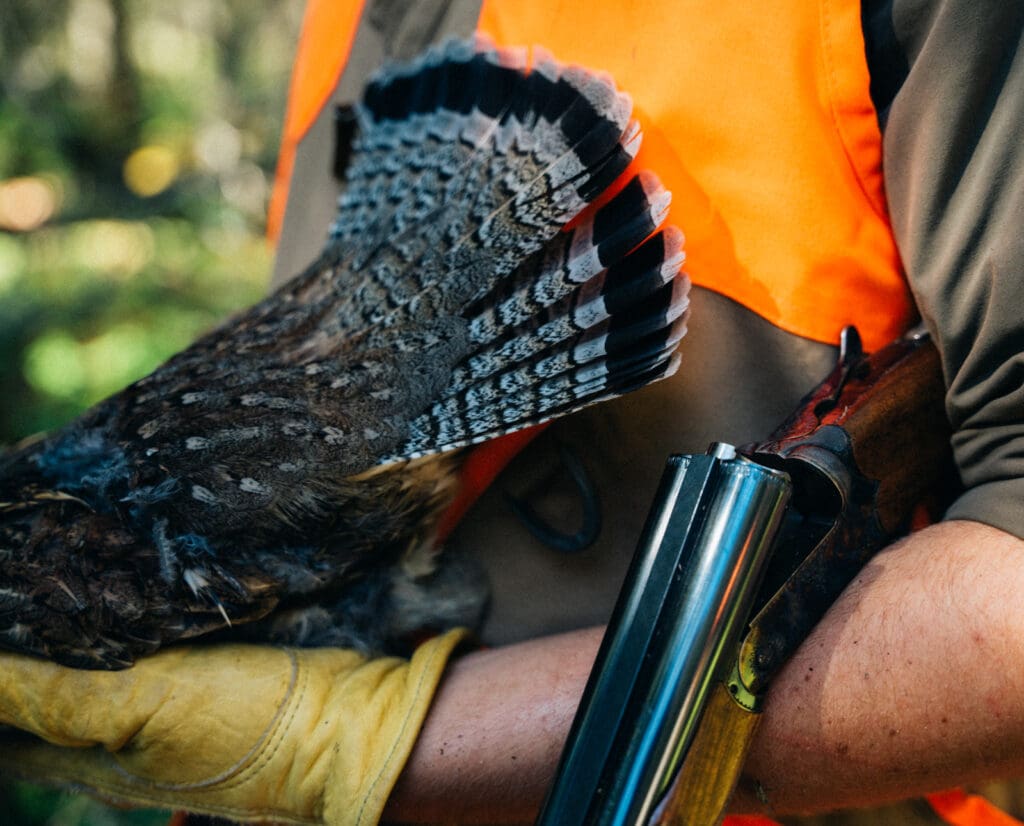
Ruffed Grouse Hunting Minnesota
Even in years that ruffed grouse numbers are low, Minnesota is still worth a visit. The state boasts one million acres for designated ruffed grouse hunting and forty areas of designated management. Most of this happens in the north-central forested regions up to the Canadian border.
The ruffed grouse season runs from September 13, 2025 to January 4, 2026. There is a daily bag limit of five birds. The limit is combined with spruce grouse.
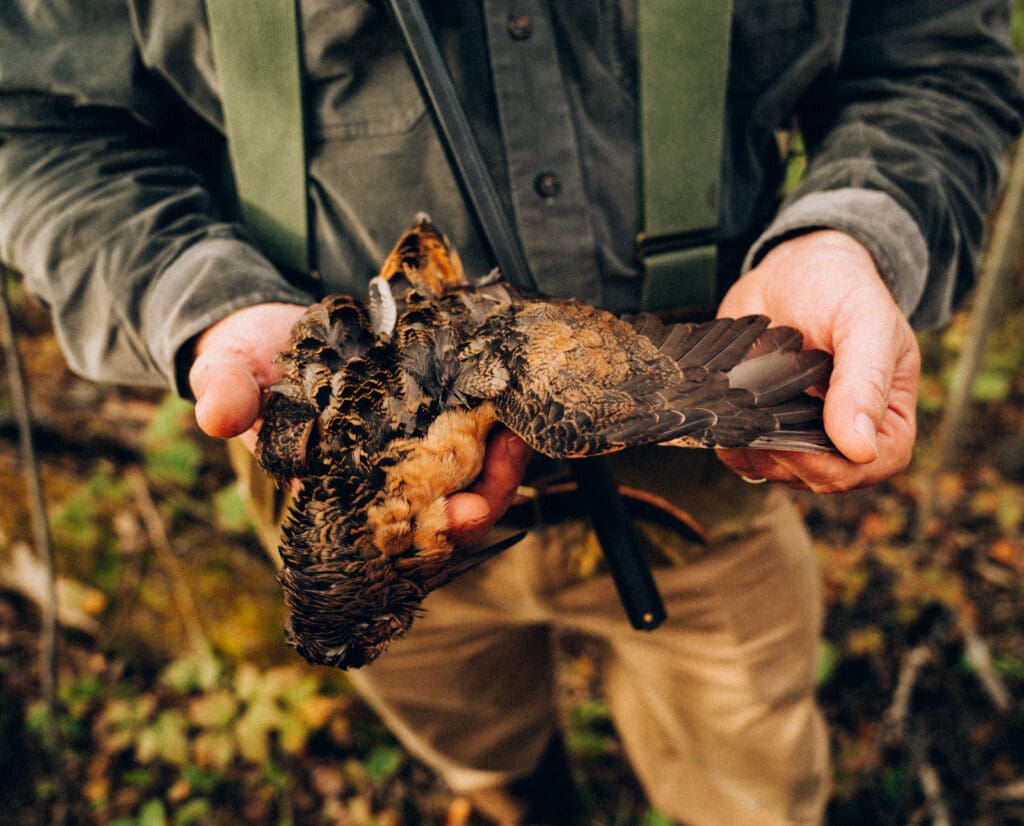
American Woodcock Hunting Minnesota
When hunting ruffed grouse, you can will probably find yourself getting on American woodcock. As migratory birds, the woodcock leave the woods of Minnesota in the cold months for warmer, southern states. Across North America, the population of American woodcock has declined but the central flyway and the state of Minnesota boast greater numbers than its eastern counterparts.
WATCH:Timber Rocket – A Project Upland Original Film
The American woodcock season runs from September 20 to November 3, 2025 and is governed by federal migratory bird laws. Like all states, a free HIP Survey number is required.
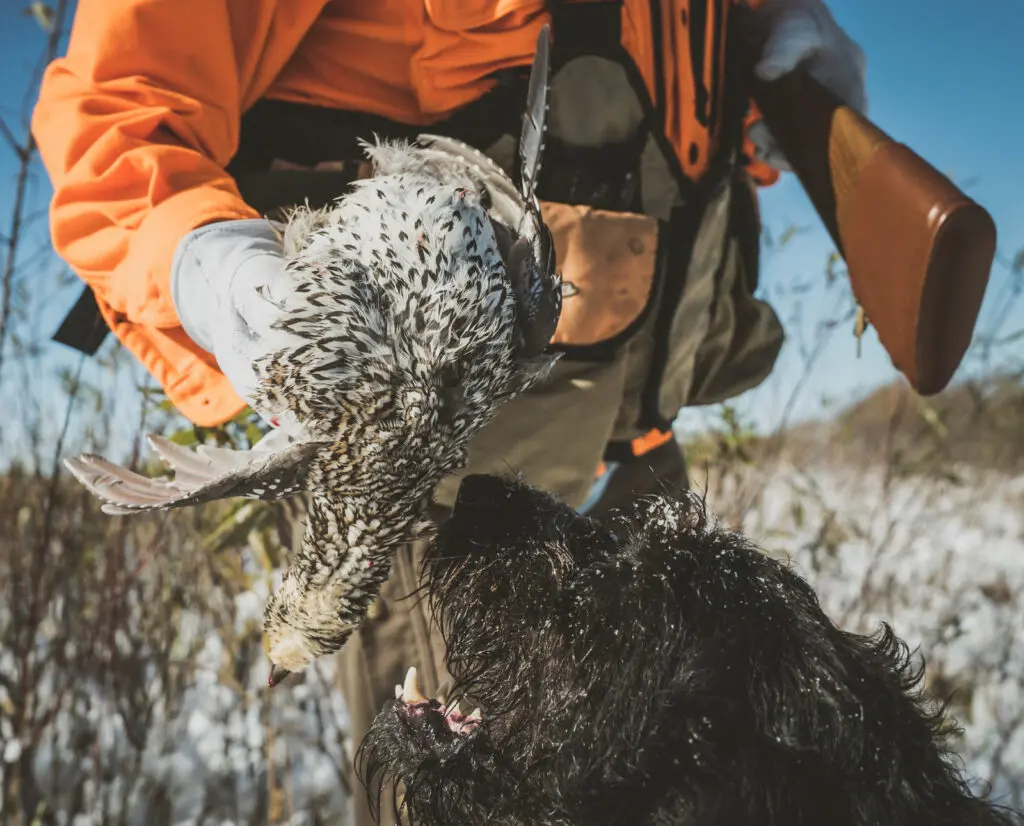
Sharp-tailed Grouse Hunting Minnesota
The sharp-tailed grouse used to be the most commonly hunted game bird in Minnesota. However, with the loss of open habitat has come the loss of their population numbers. These days, the sharp-tailed grouse range is in the far northern reaches of Minnesota and in east-central areas. You can find them where there is open grassland and in places without thick timber. If you don’t want to go trekking through the vast woods, sharp-tailed grouse is a good option for bird hunting in Minnesota.
WATCH: How Much Passion – A Sharp-tailed Grouse Society Film
The sharp-tailed grouse season runs from September 13 to November 30, 2025 in the northwestern part of the state. The east-central populations are closed to hunting. The daily bag limit is three birds.
Ring-necked Pheasant Hunting Minnesota
Ring-necked pheasant live in grasslands, too—plenty of which can be found while in Minnesota. The range for this species is the west-central and southwest portions of Minnesota. Check out the over 1,400 public wildlife areas across Minnesota for great pheasant hunting.
It’s no surprise that Minnesota is also the founding location of Pheasants Forever . Its work spans across the United States, improving prairie habitat for various game species and even pollinators.
The ring-necked pheasant season runs from October 11, 2025 to January 4, 2026 with a daily bag limit of two (roosters only). An additional stamp that costs $7.50 is required for pheasant hunting.
Prairie Chicken Hunting Lottery Minnesota
The prairie chicken is certainly a rarity in the upland world of Minnesota, but nevertheless, it exists. The prairie chicken can be found in key portions of the state in open grasslands and dense willow thickets. Only limited hunting of the prairie chicken is available. You’ll need to pay additional license fee of $23 if you are lucky enough to draw a permit.
The season runs from September 27 to October 5, 2025. The limit is two per season by lottery and the deadline to enter is usually in August. Only 125 people will be selected to hunt Minnesota prairie chickens each season.
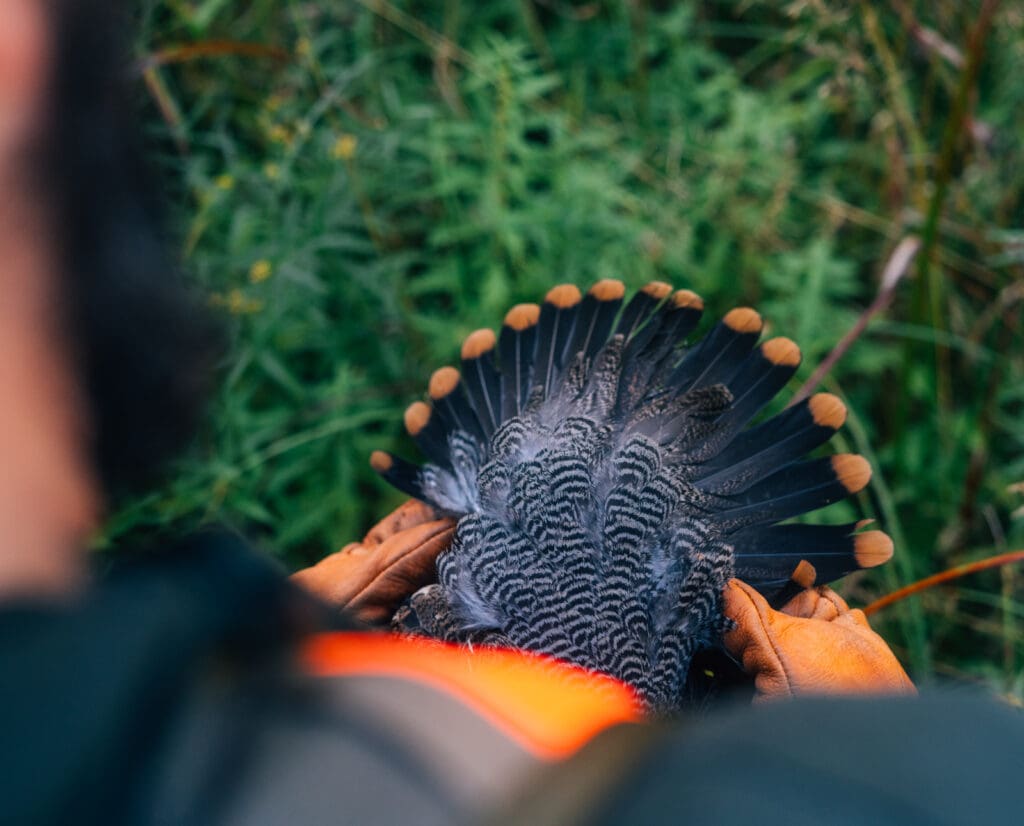
Spruce Grouse Hunting Minnesota
Spruce grouse are a rarity in the lower 48 states. Minnesota offers one of the last strongholds of solid spruce grouse populations, and recent research aims to further understand the species and expand its populations.
The reason limited opportunities exist for hunting spruce grouse, which once thrived across many states, is due to how easy they are to hunt. Unlike ruffed grouse, they lack strong survival instincts. They will often not fly away or may simply fly up into a tree and look down. We strongly urge those who seek to experience spruce grouse hunting to exercise self-restraint and ethics to ensure that the population remains viable for the future.
It is estimated that between 10,000 and 20,000 spruce grouse are harvested each season by hunters in Minnesota. Spruce grouse are found in the northernmost forests of Minnesota, within what is known as the Coniferous Forest Biome.
The spruce grouse season runs from September 13, 2025 through January 4, 2026. The daily limit is 5 birds, and it is combined with ruffed grouse.
Mourning Dove Hunting Minnesota
Dove season is a tradition in some parts of the country; in the state of Minnesota, mourning dove offers that opportunity. You can find them all over the state, except in the far northeastern woods. Most dove hunters will focus on them in the early season, but it runs from September 1 to November 29, 2025. The daily bag limit is 15 birds.
Mourning doves are governed by the federal government. As a result, a HIP survey is required.
Other Bird And Small Game Species In Minnesota
Although among the more obscure and difficult to find, there are other wild bird hunting opportunities in Minnesota. Believe it or not, up in the northwestern part of the state, there are isolated population of wild Hungarian partridge. Although not commonly targeted, it can be worth it when in the area hunting sharp-tailed grouse.
Snipe can be found throughout the state, but they are not nearly as popular as the American woodcock. The season opens a bit earlier and the bag limits are generous. Other migratory options include the sora and Virginia rail. Although they are considered waterfowl, they can be great crossover game species.
If fur is your thing, there are three species of rabbit and hare in Minnesota as well as two species of squirrel. Due to the ample grouse habitat, the snowshoe hare population is plentiful in certain parts of the state. Each offer long and generous seasons to those that choose to pursue these pastimes.
Minnesota Hunting Licenses and Fees
| License | Resident | Non-resident | Notes |
| Small Game License | $22.00 | $102.00 | |
| Small Game Youth (16-17) | $5.00 | $5.00 | |
| Small Game Senior (65+) | $13.50 | — | |
| Small Game Military | None | — | |
| Small Game 72 Hour (includes pheasant stamp) | $19.00 | $75.00 | State waterfowl and pheasant stamps are not required when you have a 72-hour license. However, the Federal stamp is required to hunt waterfowl. |
| Pheasant Stamp | $7.50 | $7.50 | |
| Migratory Waterfowl Stamp | $7.50 | $7.50 | |
| Apprentice Validation | $3.50 | $3.50 | |
| Prairie Chicken Application | $4.00 | — | Unavailable to non-residents. |
| Prairie Chicken License | $23.00 | — | Unavailable to non-residents. |
Hunter Safety Requirements In Minnesota
Hunters looking for a license to bird hunt in Minnesota will need to possess a Firearm Safety Certificate. While it’s eventually required, those without a certificate can still hunt in Minnesota under the apprentice hunter validation. This allows someone without a certificate to hunt for two years with a licensed adult hunter. Youth between 14 and 15 can hunt without a license as well, as long as they have completed the hunter education course. For more information, check out the safety course.
Blaze Orange Requirements In Minnesota
All hunters in the field during the open firearms/muzzleloader deer seasons in Minnesota must display blaze orange or blaze pink on the visible portion of the person’s cap and outer clothing above the waist. This excludes sleeves and gloves. When firearms/muzzleloader deer seasons are closed, a person may not take small game unless the visible portion of at least one article of clothing above the waist is blaze orange or blaze pink.
Blaze orange or blaze pink camouflage patterns are allowed and must be at least 50 percent blaze orange or pink within each square foot.
Project Upland always recommends that hunters wear blaze orange.
Dog Training In Minnesota
When you’re not bird hunting, you might be training your dog. From April 16 to July 14, you can train on public land in Minnesota using pigeons and blank ammunition. You need a special permit if you want to train with live ammunition and game birds. For birds other than pigeons, you must clearly mark their legs.
Project Upland Magazine Content From Minnesota
Minnesota has had a heavy influence on the Project Upland Community; you don’t have to look far through the podcast episodes, articles, and even films to find Minnesota-based content. Some of the first Project Upland films were shot in Minnesota including The Opportunity, Timber Rocket, The Reward, and Moving Forward (Wounded Warriors). Even parts of the film First Season were shot in Minnesota.
We also shot a series of films at Pineridge Grouse Camp including their brand story Adventure Awaits. Two pieces involved staff: one called Noise by the Fire with Blues International Champion Kevin Burt and the second with hunting guide Earl the Pearl. It was also used as a staging location for the iconic film called Legacy.
More unusual content includes Sacred Lek, a film about the spring dance of sharp-tailed grouse, and Woodcock Banding, a film about the spring banding season. Finally, the spruce grouse segment of the hour-long feature film #PublicGrouse, in coordination with Backcountry Hunters and Anglers, was shot in Minnesota.
The front cover photo of the Summer 2019 issue of Project Upland Magazine was taken in Minnesota by Levi Glines.
Minnesota Conservation Organizations
Minnesota Sharp-tailed Grouse Society
Ruffed Grouse and American Woodcock Society
Minnesota Prairie Chicken Society
Minnesota Chapter of Backcountry Hunters and Anglers
North American Versatile Hunting Dog Association (NAVHDA)
Pheasants Forever
A.J. DeRosa, founder of Project Upland, is a New England native with over 35 years of hunting experience across three continents. His passion for upland birds and side-by-side shotguns has taken him around the world, uncovering the stories of people and places connected to the uplands. First published in 2004, he wrote The Urban Deer Complex in 2014 and soon discovered a love for filmmaking, which led to the award-winning Project Upland film series. A.J.'s dedication to wildlife drives his advocacy for conservation policy and habitat funding at both federal and state levels. He serves as Vice Chair of the New Hampshire Fish & Game Commission, giving back to his community. You can often find A.J. and his Wirehaired Pointing Griffon, Grim, hunting in the mountains of New England—or wherever the birds lead them.




Minnesota is not on my list of where to go hunting